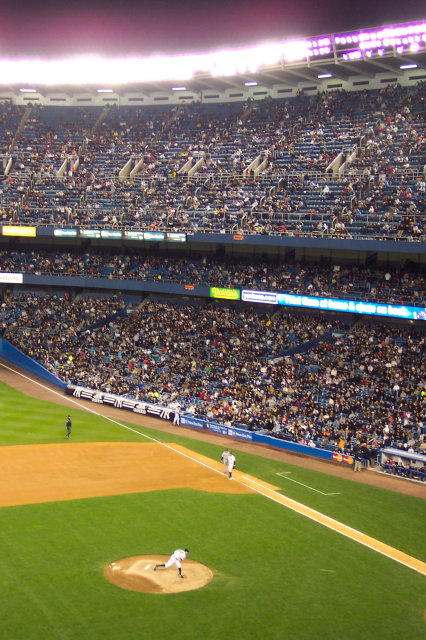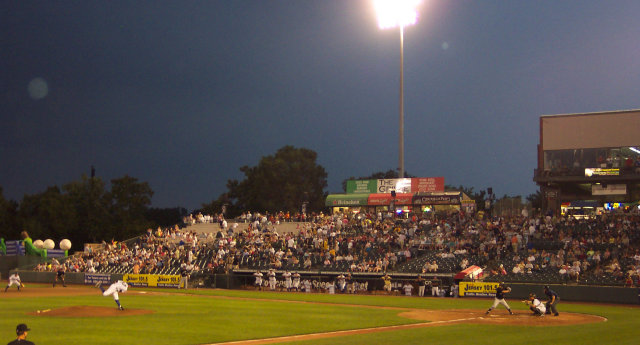Chien-Ming Wang is able to survive his alarmingly low strikeout rate by keeping his walks down and by inducing ground balls, the latter of which not only turn into outs with great frequency, but also rarely go for extra bases. Yesterday, Wang illustrated that formula for success by failing to execute it. Though none of Wang’s three walks came around to score, he did give up four runs in six innings because of the three extra-base hits he allowed. In the first, he gave up a solo home run to David Ortiz with two outs. In the third he gave up a leadoff triple to Coco Crisp that scored on a subsequent groundout by Alex Cora, and in the fifth, after hitting Crisp in the toe with one of his sinkers, he gave up another home run to Cora, the Red Sox’s surprise star of the game.
The Yankees countered the first two runs on an equally surprising three-run homer by Doug Mientkiewicz in the third, but Scott Proctor and Sean Henn combined to allow three more Boston runs (a Cora triple off Proctor in the seventh that was plated on a sac fly and a two-run Manny Ramirez homer off Henn in the eighth) before the Yankees were able to add their fourth tally on a Derek Jeter solo shot in the bottom of the eighth.
As it turns out, Wang was pitching with a broken nail on his pitching hand from the third inning on, thus the three walks, one hit batter, wild pitch (all of which came after the third inning), and unusual number of extra base knocks (Wang, who allowed just 12 homers all of last year hadn’t allowed two homers in a single game since June 28, 2005). The nail on Wang’s right index finger cracked in half perpendicular to his finger. According to Peter Abraham, Wang has reportedly fixed similar problems with glue in the past and says he will make his next start.
Despite not being on his game, Wang could have done worse. He gave the Yankees six innings and got 13 of his 18 outs on the ground (plus one K), but the nail effected his control, causing him to leave too many balls up in the zone. In addition to the two homers, both booming shots, and Crisp’s triple, Wang got two of his outs in the sixth on booming fly balls. Those shots, combined with a walk and wild pitch in that sixth frame, motivated Joe Torre to remove him after just 84 pitches.
At the plate, Alex Rodriguez went 2 for 4, including a one-out single in the sixth with the Yankees down 4-3 and Derek Jeter on base representing the tying run, but did not add to his homer or RBI totals. He thus finishes April tied with Albert Pujols for the most home runs ever in the month of April and second to Juan Gonzalez for the most RBIs ever in April. His final April line:
.355/.415/.882, 23 G, 27 R, 7 2B, 14 HR, 34 RBI, 23 K, 2 SB, 0 CS
Bobby Abreu broke an 0-for-19 slump with a single in the eighth inning.
On the injury front, Jeff Karstens was placed on the 15-day DL with a fractured right fibula, he’s expected to miss six-to-eight weeks. Colter Bean was recalled from Scranton to fill Karstens’ spot. Bean, who was a high school and college teammate of Josh Hancock’s, will likely return to the minors when Mike Mussina comes off the DL on Thursday. Johnny Damon will see a doctor about his aching back during today’s off day. Pavano threw 45 pitches in the bullpen, 20 of them from the top of the mound. He’ll throw again mid-week, but will remain on the DL for at least three weeks (which I read as “indefinitely”).
Final note from the Abraham post linked above: “The Yankees used five pitchers for the 10th straight game. That is the longest such streak in at least 50 years according to the Elias Sports Bureau.” The Karstens/Igawa game seems like a bit of a technicality there, but still, that about sums it up. One of these days, Joe Torre has to let his starter throw 110 pitches and let a single reliever finish the game regardless of the score. It’s every bit as important to break that streak as it was to snap the losing streak that ended on Saturday.




